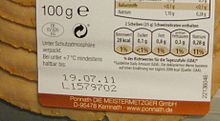Lot labeling regulation
| Basic data | |
|---|---|
| Title: | Lot labeling regulation |
| Abbreviation: | LKV |
| Type: | Federal Ordinance |
| Scope: | Federal Republic of Germany |
| Issued on the basis of: | Section 19 (1) No. 1, 2b LMBG |
| Legal matter: | Food law |
| References : | 2125-40-52 |
| Issued on: | June 23, 1993 ( BGBl. I p. 1022 ) |
| Entry into force on: | July 1, 1993 |
| Last change by: |
Art. 13 Regulation of February 22, 2006 ( Federal Law Gazette I p. 444, 448 ) |
| Effective date of the last change: |
March 7, 2006 (Art. 21 of February 22, 2006) |
| Please note the note on the applicable legal version. | |
The German Lot Identification Ordinance (LKV) is an ordinance of the Federal Ministry of Health . It regulates that (with exceptions) in Germany only those foods placed on the market may be associated with a lottery number are provided. With this identification, the product must be clearly assigned to the lot from which it originates. A lot is the quantity of all products manufactured in a single production run.

The ticket number must consist of letters, numbers or letters and numbers. For unambiguous identification, the letter L must precede the lot number if other information on the product makes it difficult to identify the lot number.
The unencrypted indication of the best-before date stating the day, month and year can replace the lot number ( § 2 LKV).
Products that are sold individually or whose largest individual area is less than ten square centimeters , for example, are exempt from the labeling requirement .